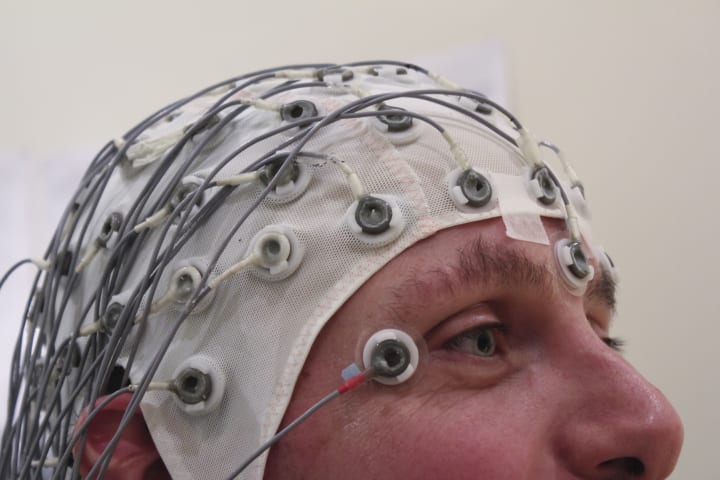
Most people’s vision of mediation is a guru seated lotus style on a peaceful mountaintop, but there’s way more to it than that. Scientists and doctors are starting to catch on that mindfulness can be a powerful tool for healing. Even if you’re not a big fan of “woo” type stuff like massage or essential oils, you can’t deny actual medical studies that say that meditation changes the structure of your brain (1). It’s also a proven thing that there’s a connection between the brain and body, and that changes to our brain chemistry affect how our bodies work. With that, it’s really not a stretch to think that meditation can heal your body.
But how exactly does all this work?

Monk meditating in front of mountain view
Basically, it all comes down to stress. It’s not a stretch to think that meditation reduces stress (2), but a lot of people don’t realize that stress causes a host of physical ailments. Meditating reduces the psychological stress you feel, and it also heals the physical problems that stress caused. If you meditate regularly, it can literally train your body to combat these problems and improve your health overall.
How Stress Messes You Up

Stress really does a number on your body, and it can cause a lot of health problems.
Let’s take a look at what stress actually does to your body. When you get in a stressful situation, you basically get that good old “fight or flight” thing going, and your autonomic nervous system kicks into gear. Back in the day, stress meant seeing a lion and having to get away from it. In order to successfully run from that lion, you need your heart to pump blood more efficiently, so your blood pressure increases and your heart pumps harder. Your muscles get super tense to run and to protect you from injury, and of course you breathe harder. Your digestive system amps up, meaning more acid being produced by your stomach and more sugar produced by your liver. Your immune system also goes a little crazy because who cares about fighting off a cold when you’re running from a lion, amirite? Besides, you need more important hormones like cortisol and epinephrine.
Now in the modern day, stress is more “oh god I forgot to write those reports at work” and less “holy crap a lion!” But our bodies don’t know that, so they still do all those things. Back in the day, this response was no big deal because we could relax after running away from that lion and let our bodies return to normal. Imagine if you couldn’t ever quite calm down and your body kept up that response. That’s chronic stress, and why doctors say chronic stress causes or worsens problems like hypertension, migraines, asthma, heartburn, and even Type 2 diabetes (3).
Ways Meditation Can Heal

Meditation can be a way to manage the stress of modern life.
If you practice some kind of mindful meditation regularly, no matter what kind you do, you’ll see a bunch of benefits to your physical as well as emotional health. Here’s a few ways meditating can help you chill out and even be more healthy physically.
Treats and prevents chronic illnesses
The list of ailments that meditation can treat is pretty long, and includes rheumatoid arthritis, asthma, hypertension, and inflammatory bowel syndrome (4). All these go back to that idea of chronic stress and the effect all those fight or flight responses have on your body. Cortisol is also key here. That’s a hormone your body releases in response to stress, and it leads to inflammation, which can cause everything from arthritis to IBS. Meditation brings down cortisol levels, and that in turn reduces inflammation. When you meditate regularly, you keep cortisol low and avoid inflammation altogether, so you can even prevent these kinds of diseases from ever affecting you.
Helps alleviate chronic pain
So scientists did a thing where they took recent spinal injury patients and got them to practice some creative visualization of their pain leaving their bodies--essentially meditating. And it worked! Meditating helped these patients reduce their pain levels (5). Regular meditating calms down the nervous system, which can also help with chronic pain conditions that are caused by the nerves, like fibromyalgia. Now, scientists haven’t quite figured out how meditation alleviates pain, exactly, but most theories revolve around the sympathetic nervous system that creates all those super fun stress symptoms.
Increases weight loss
Remember when we talked about the liver releasing sugar? That sugar normally gets used to run from the lion, but if there is no lion, it just gets turned into fat. Also, our good friend cortisol can actually increase our appetite, making us want to “stress eat.” Eating lights up the pleasure centers in our brains, which makes us happy and not stressed, so we see it as some sort of primal solution for stress, when really it’s a problem. But meditation can help all of this. In addition to bringing down cortisol levels, meditation chills you out, so you have less urge to stress eat. Mindful meditation can be super useful because it can help you make better food choices in general (6).
Helps you quit your bad habits
We’ve talked about how meditation changes your brain, but it also targets specific parts of the brain. These parts of the brain control emotional regulation and self-awareness, which are super important in conquering addictive behaviors (7). The area of the brain we’re talking about specifically also controls mood, and meditating can help you regulate your mood and even be more optimistic, which can help you break out of negative cycles and finally quit smoking or drink less or break whatever habit is negatively affecting your health.

Group meditation can be a great way to get started.
Even if you’re not a “woo” kind of person, you can see that meditation can actually change the structure of our brains for the better. When you practice some kind of meditation even as little as four hours per week, you will help your body better respond to the stressors of modern life, even if they aren’t running from lions.
References (because SCIENCE!)

an EEG cap that records electrical impulses in the brain
- Harvard Gazette; Sue McGreevey, 2011. “Eight Weeks to a Better Brain” http://news.harvard.edu/gazette/story/2011/01/eight-weeks-to-a-better-brain/
- Mayo Clinic; “Mediation: A simple, fast way to reduce stress:” http://www.mayoclinic.org/tests-procedures/meditation/in-depth/meditation/art-20045858
- American Psychological Association; “Stress Effects on the Body.” http://www.apa.org/helpcenter/stress-body.aspx
- John Hopkins Medicine News; Madhav Goyal, M.D., M.P.H.; 2014 “Johns Hopkins research suggests meditation may reduce symptoms” http://www.hopkinsmedicine.org/news/media/releases/meditation_for_anxiety_and_depression
- The Atlantic, Brian Steiner; 2014. “Treating Chronic Pain with Meditation” http://www.theatlantic.com/health/archive/2014/04/treating-chronic-pain-with-meditation/284182/
- PubMed.gov; Bonadonna R; 2003. “Mediation’s impact on chronic illness” http://www.ncbi.nlm.nih.gov/pubmed/14650573
- Psychology Today; Alexander, Ronald, PhD; “Mindful Meditation & Addiction” https://www.psychologytoday.com/blog/the-wise-open-mind/201004/mindfulness-meditation-addiction






Comments
There are no comments for this story
Be the first to respond and start the conversation.